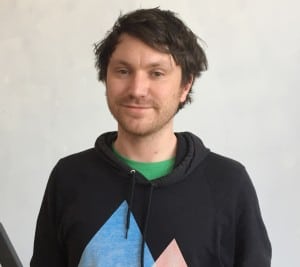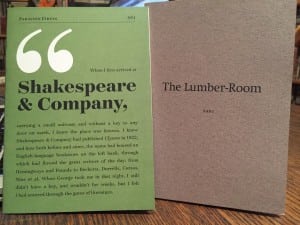British publisher sets up shop in Beacon
By Alison Rooney
What a shame it is that the mailbox is looked upon most often with trepidation these days, filled with bills, medical claim denials and solicitations rather than letters. Yet, just as there are still plenty of people who profess a fondness for books (the bound kind, not the “e” variant), there are also plenty who get that flutter from extracting something carefully composed sent to them in a hand-addressed envelope.
The people behind Paravion Press, a specialty printer, publisher and collaborative endeavor, recently relocated from London to Beacon, wear their epistolary hearts on their sleeves. It’s quite evident in their line of products, most of which combine small print runs of short works of literature in the public domain, designed and printed in-house with a blank page upon which to write a note and an envelope scaled to house the book; the package is then sent via mail to a lucky recipient.
As Paravion explains on its website: “We like books. Real books. Paper and ink. And we like letters. Real letters. Paper and ink also. Words, a story, from one person to another, sent from one place to another, arriving in the mail. A rare pleasure these days.”
The love of books, along with a wandering spirit, led Englishman Will Brady and several of his friends to, more or less on a lark, open a bookstore 12 years ago on the Greek island of Santorini. Atlantis Books was run as a collective modeled on Shakespeare and Company in Paris, where itinerant travelers, students, philosophers and the unclassified were encouraged to stay overnight in exchange for a little bit of work plus a little bit of writing.

Seeking to emulate a Socialist utopia of the literary kind, or, as Brady puts it, “partly a silly idea you have when you are young,” Atlantis took hold and in fact is still there, albeit needing assists from time to time, particularly during the 2009 economic meltdown. Fewer people were traveling on holidays where ambling and browsing lead to the kinds of impulse purchases which keep bookstores of this ilk in business. E-readers were gaining in popularity and airline security measures took away the space needed in carry-on bags for the toting home of coffee table books.
Brady holds an hono(u)rs degree in literature and fine art, and received a master’s in American literature from the University of Edinburgh, researching his thesis on Raymond Carver not long after Atlantis opened in part with a three-month-long drive across America. Working in graphic design, Brady merged his interest in books and design, developing a focus on typography. It was this this hybrid interest, together with the need to figure out a way to keep Atlantis in business, that led to Paravion Press.
“I thought, could we make books tailored to the market we have?” Brady recalls. He got the idea to take things in the public domain, commission colleagues to come up with accompanying designs and then typeset and print them himself to sell in the store.

Working from Project Gutenberg (gutenberg.org), a volunteer-run site that archives works in the public domain, Brady took the text and digitally reconceived it, printing it on quality paper and assembled the small books by hand — in other words, using modern technologies to create something designed to appeal to those with an affinity for the past.
The initial run, with works by Katherine Mansfield, Saki, Sherwood Anderson, Mark Twain and Anton Chekhov, proved so successful that a mailbox was put inside the bookstore so people could immediately post their purchases. The first titles beget others and illustrations became a component of the next grouping. Then a commission came, asking Paravion to do an illustrated set related to New York comprised of works by O’Henry, Walt Whitman and Maxim Gorky. This was followed by similar sets for London and Madrid. Paravion also produced some original work.
Paravion’s catalog includes a set of 10 poems by Emily Dickinson, each on its own “aerogramme” type of self-sealing sheet, with room, as always, to write a little something of one’s own, all bundled in a larger package and called, with a wink, E-Mail. There’s also Pony Express, a collection of the 19th-century bulletins assembled in a fold-out broadsheet. More elaborate projects, including one setting off works in English by Edgar Allan Poe alongside Baudelaire’s French translations as parallel texts, are planned, each within the framework of “tangible correspondence … paper, ink, words, and of course, the postal service.”

The books are sold around the world, largely through personal contacts. “I happen to be surrounded by people who run bookshops,” Brady says, noting that successful bookshops nowadays “are ones that are event spaces as social hubs. In Edinburgh I worked in a secondhand bookshop where there was very much a feeling that it was a social institution which served a community function.”
Binnacle Books, new to Beacon, is carrying much of Paravion’s line. It was co-owner Corey Eastwood who led both Brady and Paravion to the Hudson Valley. Brady moved to New York “for love,” following his American girlfriend (now wife) to Brooklyn and relocating Paravion from London. “I was trying to do a mail-order business from a tiny, overrun apartment, and I knew I needed to get studio space,” he says.
Finding New York City tremendously expensive, Brady realized he could afford little more than a desk in someone else’s place. Coming up with Eastwood for a day of hiking near Beacon, Brady was inspired. “It seemed like such a functional town, with so much going on to tap into,” he says.

Walking back into the heart of Beacon, he saw a sign outside the old Beacon High School offering studio spaces. He was amazed by the amount of space, enough to start a printing operation. “I don’t want to stare at computer screens all day — I want to do more ‘making,’ ” he says.
Now in the midst of setting up his quarters — some stock and equipment has yet to arrive from London — Brady is expanding into design and printing services. “Essentially, I have one client now: myself, and now I’d like to provide a service to other people,” he says.
A selection of Paravion Press projects are on hand at Binnacle Books, 321 Main St. and the full catalog can be ordered at paravionpress.org.
